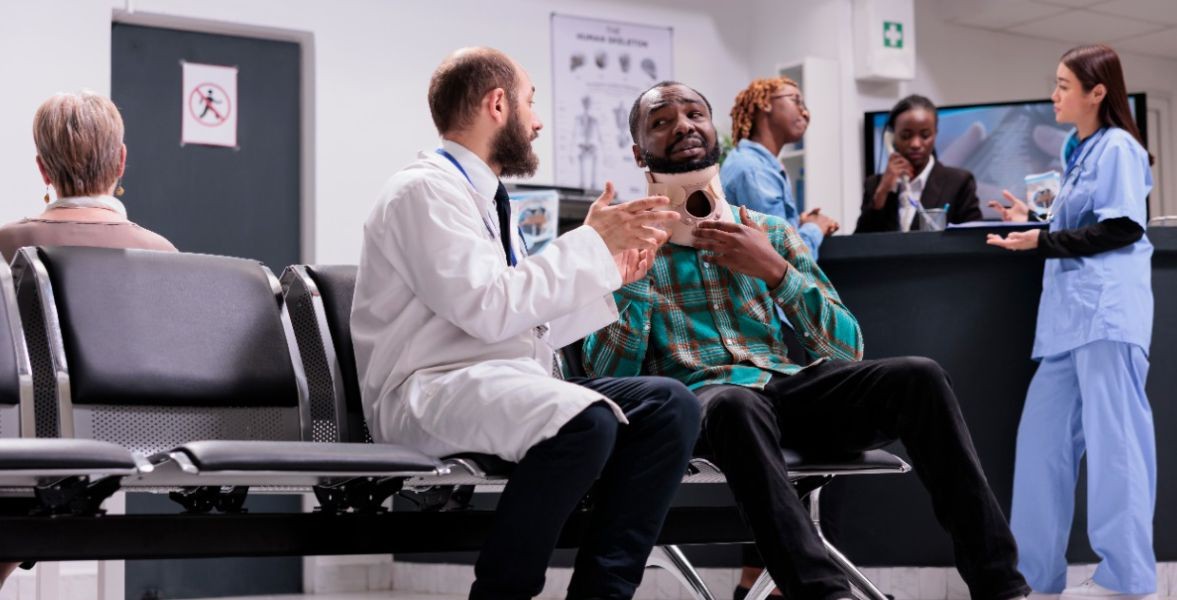Published - Thu, 04 Aug 2022

Trauma - Types & Disorder
Trauma is the response to a deeply
distressing or perturbing event that overwhelms the individual’s ability to
cope and causes feelings of helplessness, diminishes their sense of self-worth,
and their ability to feel emotions and experiences.
While there aren't any objective
criteria to gauge that events can cause post-trauma symptoms, circumstances
usually involve the loss of management, betrayal, abuse of power, helplessness,
pain, and confusion.
The event needn't rise to the extent of
war, or natural disaster, It could be a personal assault to have an effect on
an individual deeply and alter their experiences. Traumatic things that cause
post-trauma symptoms vary individually and quite dramatically from person to
person. Indeed, it's subjective.
Not each traumatized person develops
post-traumatic stress disorder (PTSD). Some individuals develop some symptoms
like those who are more sensitive, it might take some weeks to develop
symptoms. This is often known as acute stress disorder (ASD).
When the symptoms last over a month and
seriously have an effect on the person’s ability to perform, the person could
also be stricken by an anxiety disorder. Some individuals with anxiety disorder
don’t show symptoms for months after the event itself. And a few individuals are
affected by anxiety disorder symptoms of a traumatic experience for the
remainder of their life. Symptoms of anxiety disorder will present as panic
attacks, depression, self-destructive thoughts and feelings, drug abuse,
feelings of being isolated, and not having the ability to finish daily tasks.
There is no magic treatment that may
heal you overnight, and neither is there one kind of psychotherapy that's right
for everybody, however, it is advisable to seek treatment whenever you face any
such issues.
Healing is sort of a marathon. It needs
preparation, recurrent observation, courage, determination, and also the
support of others—including that of a health expert.
When trying to find an expert, it's
very important to keep in mind that, the medical aid is being offered as a
collaborator and not being imposed on you. Additionally, it's crucial that you
simply feel safe in your therapeutic relationship.
Studies have found that people who actively
participate in their medical aid gain more and get better quickly.
Treatments offered for PTSD
1. Pharmacotherapy is the use of medicines to manage highly
troubled trauma reactions. Medications are shown to be useful with the following
reactions/symptoms:
o
Intrusive
symptoms
o
Hyperarousal
o
Emotional
reactivity
o
Irritability
o
Depression
Taking medication doesn't mean trauma
and associated pain will go after a single dose. Medications will slowly work
till symptoms are less intense and manageable.
If you choose to use medications,
consult a shrink and continue consulting a shrink for as long as you're taking
the medications. Inform the shrink of how the medications are impacting you.
Some medications have a few side effects that might not be tolerable to you,
and a few individuals don't respond favorably to medications.
2. BEHAVIOR medical aid
The most common type of behavior
modification is exposure. In the desensitization technique, one is made to face
one’s fears bit by bit. for example, the reminiscences of a traumatic
event–without the dreaded consequence occurring. Often, this exposure ends up
in the individual learning that the worry or negative feeling is unwarranted, which
successively permits the worry to decrease.
§ Exposure therapy has been found to scale back anxiety
and depression, improve social adjustment, and organize the trauma memory.
There square measure varied kinds of exposure therapy:
o
Imaginal
exposure: A person imagines the dreaded event as vividly as doable.
o
In
vivo exposure: The exposure happens within the medical aid.
o
Systematic
desensitization: The individual is exposed to in turn additional fear-inducing
things. This exposure is paired with relaxation.
Exposure therapy could be an extremely
effective treatment for posttraumatic stress (PTSD).
§ Another kind of behavior modification
is Stress immunization coaching (SIT), also called relaxation coaching. Stress
immunization coaching teaches people to manage stress and anxiety.
§ COGNITIVE BEHAVIORAL THERAPY
Cognitive Behavioral Therapy (CBT) is
grounded within the concept a person should correct and alter incorrect
thoughts and increase information and skills. Common parts of psychological
feature activity include:
o
Teaching
people a way to breathe to manage anxiety and stress
o
Educating
people on traditional reactions to trauma
Exposure therapy
Identifying and evaluating negative,
incorrect, and irrational thoughts and substituting them with additional
correct and fewer negative thoughts.
§ There is no guiding principle for
psychotherapy. In general, a hypnotherapist guides the individual in medical
aid into a hypnotic state, then engages the person in spoken communication or
speaks to the person concerning bound key issues. Most hypnotherapists believe
that the emotions and thoughts that a person comes into contact with whereas
below mental state square measure crucial to healing.
§ PSYCHODYNAMIC THERAPY
The
goal of psychodynamic trauma therapy is to identify which phase of the
traumatic response the individual is stuck in. Once this is discerned, the
therapist can determine which aspects of the traumatic event interfere with the
processing and integration of the trauma. Common elements of psychodynamic
therapy include:
o
Taking
the individual’s developmental history and childhood into account
o
Emphasizing
on understanding the meaning of the trauma
o
Looking
at how the trauma has impacted the individual’s sense of self and
relationships, as well as what has been lost due to the traumatic event
§ GROUP THERAPY
There are a variety of different groups
for trauma survivors. Some groups are led by therapists, others by peers. Some
are educational, some focus on giving support, and other groups are
therapeutic. Groups are most effective when they occur in addition to individual
therapy. A trauma survivor needs to choose a group that is in line with where
one is in the healing journey:
o
Safety/victim
phase: Choose a group focused on self-care and coping skills.
o
Remembering
and mourning/survivor phase: Pick a group focused on telling the trauma story.
o
Reconnection/thriver
phase: Join a group that aims to create a connection with people.
o
Educational
groups are appropriate during all phases.
Created by
Rigomo Team
Rigomo is a leading online education platform that offers a wide range of courses to help individuals enhance their skills and achieve their career goals. With our user-friendly interface and expert instructors, we strive to provide high-quality education to everyone, anytime and anywhere. Join us today and take the first step towards a brighter future.
Rigomo is an e-learning platform that was founded in 2019 by a team of dedicated professionals with a passion for revolutionizing the way people learn. The platform offers a range of online courses that cover various industries, including business, technology, healthcare, and more.
Rigomo's courses are designed to be interactive and engaging, with a focus on practical skills that learners can apply in their careers. The platform uses a combination of video lectures, quizzes, and hands-on projects to help learners master the subject matter.
Rigomo is committed to providing affordable and accessible education to people around the world. The platform offers a range of pricing options, including monthly and annual subscriptions, as well as pay-as-you-go options for individual courses.
Since its launch, Rigomo has received numerous accolades for its innovative approach to e-learning. The platform has helped thousands of learners across the globe acquire new skills and advance their careers.
As Rigomo continues to grow, the team remains committed to providing high-quality education that is accessible to all. The platform is constantly updating its courses and features to ensure that learners have access to the latest tools and technologies.
Comments (0)
Search
Popular categories
Health and Wellness
231Skill Development
7Technology
5Community Impact
2Success story
2Creativity
1Latest blogs

DeepSchool: The Story of an Idea That Refused to Sit Still
Tue, 02 Dec 2025

Transforming Emergency Care: The Story Behind Rigomo's Revolutionary PPMMP Course
Sun, 12 May 2024

Empowering Rural Healthcare: How Pogiko's AI is Bridging the Gap in Medical Services
Thu, 25 Apr 2024

Write a public review